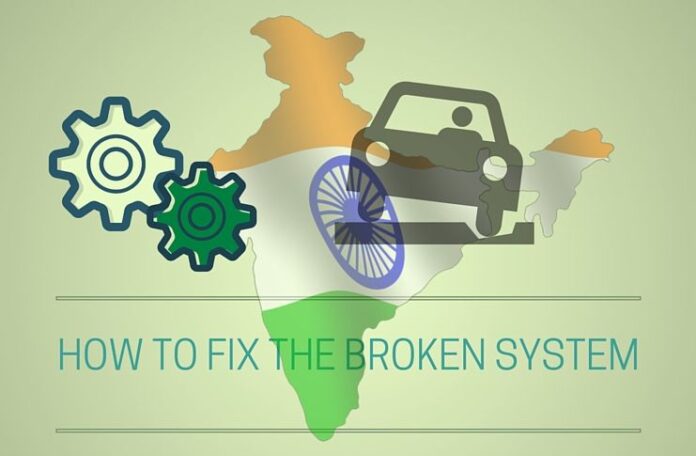
“I am against the system” has been the overarching sentiment and “I will change it” the clarion call of many well-intentioned political leaders that have been voted to form governments at the center and many states in India since her independence. Others have tried to work within the system to serve the population. Regardless of their approach, these leaders have continued to disappoint us in the long run. A prevalent misconception is that these leaders fail us because the system changes them and makes them corrupt. This fallacy has its costs. With no valid rationale to rely upon, the voters in India have turned to faith; it always begins with “I believe that this man is incorruptible. I feel that he is the one who will do it.” And when it ends badly, and it always does, we have someone else raising the hopes of those who were disappointed, and of those who were too young to witness the prior debacle(s).
The repeated failures of our political leaders have nothing to do with their corruptibility, insincerity or their inability to meet the standards of virtue that the voters have come to expect from them. The cause of our failures has a name. It is called the fatal conceit, and we, as a nation, are trapped in it. This article is not going to discuss the broad, and sometimes well understood, errors of socialism. It will discuss, using an analogy, a specific problem area that is not so well understood, especially in India, but has strengthened our entrapment in the conceit.
These leaders with their sincere initiatives might move the car, but what they certainly will not be able to do is to start it
If aliens were to land in New Delhi, and see how our political leaders and bureaucrats try to get things done, they might compare them to the passengers of a broken car who, with no knowledge of what makes the vehicle run or why it broke down, roll up their sleeves and start pushing it, pulling it, lifting it and rolling it, just to get it moving. The car does not start, and it never will, with efforts of such kind. But the co-passengers, who themselves don’t realize how the car ought to be run, see, and are appreciative of, the emotions, the honesty, the hard work and the relentlessness with which their leaders try to move the car.
While one doesn’t need an alien brain to deduce that pushing, pulling or rolling a car are not the most efficient ways to move it, and will never appreciate someone trying to run a car without engine oil or gasoline in it, it is not so intuitive to understand what is needed for ‘the system’, which our leaders have been promising to change or which they’ve been trying to serve us with, to function efficiently. The mechanics are subtle and sometimes even counterintuitive.
We will investigate how the mechanics, or lack thereof, have or have not worked on the ground, with the help of experiences of three individuals I recently met – Anil Chowdhary, Lalit Mohan Jindal, and Dr. Subramanian Swamy.
Anil Chowdhary
Anil Chowdhary is a BJP Parshad in the Govindpuram locality of Ghaziabad. He is an ambitious politician; I first got a glimpse of the municipal work he has been able to facilitate in the public park of Govindpuram (pictures below). It has two gazebos, swing sets, and paved path around the park for walking and running. Anil has certainly got the car moving, but not with engine oil and fuel. He has tied ropes to the axle of the car and is pulling it relentlessly. The car is still broken. Let’s get on the ground to better understand the analogy.
During the mid-19th century, Ellis Sylvester Chesbrough was assigned the task to build the sewer system of Chicago. The city of Chicago sits on a flat plain, and engineers of the time didn’t think it was possible to design an underground sewer system in the city. So Mr. Chesbrough did something nobody had imagined. He lifted the entire city of Chicago using jackscrews; an unbelievable engineering feat. 150 years later, the engineers of Ghaziabad did something even more unbelievable; they tried to reverse the laws of physics. They built a sewer system in Govindpuram against the natural incline of northern plains. A kindergarten kid in India would tell you that the rivers in the subcontinent flow from north to south. The engineers built the sewer lines to flow from south to north. It has been a nightmare for the people of Govindpuram, especially when it rains and the rain water flows in the opposite direction.
On top of this engineering marvel, a man, in the process of constructing the basement of his house, poured cement into one of the primary sewer lines and blocked it.
I asked Anil “Why don’t you penalize this person, and get court orders to unclog the sewer line? I am sure there must be a provision in the contract signed between the state and the plot owner when the land was sold. Or there must be a law under which Parshads can impose penalties to punish damages caused to public property. Is it not possible for you, as the representative of the people of Govindpuram, to file a lawsuit against the state government for using public money for building a dysfunctional, and a potentially life-threatening sewer system?” Anil was quick to reply to the first part of my question “There is a provision in law to levy fines or to get the sewer line repaired, but if I impose a penalty, or try to get my laborers inside his basement to unclog the line, I will probably need to take the offender to court only to get stuck in a long trial. He is not going to comply otherwise.”
There are two reasons why the car does not start for Anil. Firstly, the engine oil is in short supply; the courts, that resolve friction between moving parts of the system, are overburdened and therefore slow to respond. The second reason is a result of the first. Having lived with this state of the judiciary, people’s understanding of its role, and their expectations from it, especially in the matters of disputes that do not involve private property, have waned over the years. The passengers don’t know that the car needs engine oil. The people of Govindpuram, who could have themselves taken the “sewer-clogger” and the authorities that approved the sewer design to court under several sections of the current law, don’t do it because a legal resolution is, or rather has become, as counterintuitive to them, as it is to our political leaders.
So Anil does what he can do in his capacity as a Parshad. He has been trying to reason with the offender to get the sewer line working again. He is trying to move the car by tying it to a horse. A lawsuit against the municipal corporation, I guessed, was out of the question for him. To be fair to Anil, producing engine oil is not his job.
Note here, that we are not talking about the fatal conceit, the inevitable failure of central planning, or about how keeping the involvement of the government, in making the choice of engineers and contractors in building the sewer system of Govindpuram, at a minimal level, would have prevented the waste in the first place. That discussion, as mentioned above, is not in the scope of this article. Neither are we talking about how the engine oil ought to be produced. Judicial and police reforms are also out of the scope of this article. The goal of this article is to illustrate how important good quality engine oil is to get the car started.
Our conversation drifted to the central government’s Clean India campaign. Garbage disposal, as opposed to sewerage, is strictly a municipal subject, so it comes directly under Anil. There is garbage on the roads and around local markets. Stray dogs fight over the jurisdiction of the areas with maximum garbage and sometimes forget that humans are not their competitors. It’s quite a spectacle. Anil has got dumpsters installed on the side of the roads as a temporary solution, but there is litter around them too.
My questions to Anil were becoming repetitive. “Can’t you impose penalties on people who litter garbage around the dumpsters, on the road, or near the market? Have you examined the private garbage collectors who might be violating their contract with the municipal corporation” My questions might have been repetitive, but they are valid; there is no need for an earth-shattering revolutionary solution to make India clean. The problem is simple and so is the solution.
Anil’s answer should not surprise you if you’ve lived in Ghaziabad (the city’s crime rate rivals that of Chicago). “Forget about taking the contract between private garbage collectors and the municipal corporation to court, there are few people in this area that take pride in littering garbage. They feel that doing something that the law does not permit demonstrates their power. They have connections with the ruling party in the state. If I knock on their door with a summon in my hand, I will probably need bodyguards. Then there are others who will simply take the summon courteously only to later throw it in a dustbin.” Anil, in his answer, indicated that the small amount of engine oil he has access to has become useless, as the mechanism to deliver the oil to the engine is not working. He does not have access to a functional police.
I’m glad that he didn’t say “Where will I get the evidence to furnish in court?” A summon by a police officer who has witnessed littering is a sufficient enough deterrent (I will explain in a bit). I was also relieved that he did not suggest the hundreds of expensive bureaucratic “intuitive-fixes” on the lines of “installing CCTV cameras to collect evidence”, for if he did, he would have shown, that like the passengers of the broken car, he too missed an aspect that is crucial to understand how the car runs. Dr. Subramanian Swamy often explains it with the help of an equation. If α is the probability of being caught in the act, B is the benefit one gets out the act, and P is the penalty of getting caught, then your expected return R is equal to α X P + (1– α) X B. For the expected return of the act to be negative, we need that P > B [(1/ α) – 1]. You don’t necessarily need a high α, all you need is that the penalty P is high enough to make the return negative. Besides, the benefit B one gets in littering garbage is not monetary; it only takes a little bit of effort not to litter. So even if α is low, a summon from an officer who can testify, under penalty of perjury, should be a sufficient deterrent.
[Side Note: I don’t want to digress into the topic of how the engine oil ought to be produced or how we can enhance its quality, and I am not sure whether a video recorded on a mobile phone is an admissible evidence in a court for misdemeanors, but it seems to me that it might be difficult for someone to deny when he/ she is confronted with a video of him/ her littering garbage.]
And don’t worry, there won’t be havoc with police officers accusing their enemies, or enemies of their relatives, of littering garbage. Conflicts will still be settled in courts. Most people won’t litter only because they don’t want to go through the trouble of appearing in a court.
I can relate to this equation with one of my personal experiences. I used to speed on the highways of Georgia like there was no tomorrow. I never got caught. In the summer of 2012, when I was driving from Atlanta to Washington D. C., I was chased by a police officer and served a summon to appear in court. The police officer was supremely disgusted having chased my car in the middle of the night at more than 90 miles per hour. (Speeding 20 miles per hour above the 70 miles per hour speed limit is a Class-I misdemeanor in the state of Virginia.) I had to hire a lawyer and pay a huge penalty. I stopped speeding even before the court penalized me, and haven’t exceeded the speed limit since. The people in the U.S. who want to start the car have access to high-quality engine oil; the rule of law.
Anil is also trying to enforce a regulation to limit the number of floors that can be built on a plot of land. What intrigued me was that he is doing so to solve a relatively simple problem. “Parking space in the area is limited and when people rent out their multi-storied houses, there might be chaos.” he says. Unlike in the U.S., where neighborhoods decide on such subjects with a majority vote, Anil needs a court order, and he has been able to secure one. When I asked, “Don’t you think that giving parking permits to each homeowner, with temporary permits for guests, is a better solution?” Anil said that he fears for his life “If I try to tow a car that does not have a parking permit, they will come after me with a bamboo stick.” I thought in my mind “Won’t the same people come after you when you try to limit the number of floors?” but I guessed that there are a few regulations that even the most reprobate won’t dare to break. Just because he does not have access to engine oil, Anil is trying to roll the entire car to move it.
“You don’t understand the situation in India.” he continued. “Just to get an injunction on a few illegal shops, that clearly violated the town planning rules, I have been running up and down the Allahabad High Court. A housing unit was recently rented by three rowdy brothers who eve teased women in the area. An old man in the neighborhood confronted them, and after a few days when he went to the police station to lodge a complaint, he found that the goons had already filed a complaint against him accusing him of stalking their mother. Now tell me what should one do?”. Anil held a meeting in the neighborhood and was successful in encouraging the home owners to take a stand against the goons. The issue got resolved without, repeat: without, a court intervention. Without the engine oil.
Our current government at the center is devising new ways to move the car with the Clean India campaign and Smart Cities with state-of-the-art sewer systems. These are same-old ways of pushing, pulling and rolling the car. There is no doubt that our leaders have been emotional, honest, hardworking and relentless. And it is hard to criticize their sincere efforts. But as Milton Friedman often said, “Sincerity is an overrated virtue.” These leaders with their sincere initiatives might move the car, but what they certainly will not be able to do is to start it. All they need to do to start the car is to empower Anil and the people of Govindpuram with an effective judiciary and police.
- Solution to Kashmir: A Lesson From The Prairies, the Pampas and the Kashyaps - February 12, 2019
- Kartavya,Adhikaar And Skill. A Worthy recipient of Skill India Scheme? - October 16, 2017
- Demonetization Has Opened A Window Of Opportunity For Modi - December 21, 2016











All I can say on the story of the Parshad, the system, people,the law dispensers, courts and all other assorted things the only remedy is to dismantle the car and get a new one .Filling engine oil and gas may start the car elsewhere but not in India .There may be various opinions which model/make new car we should go for to replace the old one,a purchase committee can be entrusted with the job and the new car also may not start for which we appoint commissions of inquiry and expect the final unbinding report after half a century hopefully .
So what’s the hurry;let’s wait for the grand entry of Modi , Ramdev and Swamy into the story in the second part and see how they push the car.
Asfar as Modiji & Babaji concerned ok. But still one has doubts of Dr Swamy considering his past actions. None is sure whether Swamy is an asset or a liability for BJP.!!